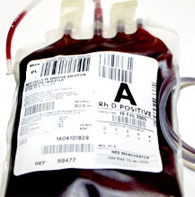Reversing its decision to reject all blood donations from men who have sex with men - even just once, the Red Cross of Thailand announced last week that it would rework the form to more comprehensively assess a potential donor's risk of disease.

The 'window period' is the time it takes for a person who has been infected with HIV to react to the virus by creating HIV antibodies. This is called seroconversion. During the window period, people infected with HIV have no antibodies in their blood that can be detected by an HIV test, even though the person may already have high levels of HIV in their blood, sexual fluids, or breast milk. The three-month window period is normal for most of the population although many people will have detectable antibodies in three or four weeks. In very, very rare cases, a person could take six months to produce antibodies.
(The American Red Cross today says a lifetime ban for gay men is "no longer medically and scientifically warranted" although US Food and Drug Administration still bans gay men for life.)
The decision attracted criticism by gay and human rights groups in Bangkok which urged the Red Cross to focus on screening out anyone - gay or heterosexual - with risky sexual behaviour and drug habits, instead of blocking all gay men from donating by only asking about same-sex relations.
The Commission for Human Rights of Thailand threatened to file a lawsuit with the Constitutional Court saying that the Red Cross's decision amounted to discrimination.
According to media reports, Soisaang Pikulsod, director of the Thai Red Cross National Blood Centre, earlier said that the blood bank had large amounts of unused blood that had tested HIV-positive and most of the infected blood was reportedly from men who were having unprotected sex with other men.
Soisaang revealed that the agency had become concerned after it found HIV in blood from 500 donors in 2007. She added that although almost all the donors were notified of their infection only one third of them returned for further counselling. Of those who returned, half said they were gay and half said they were bisexual.
"We didn't mean to hurt anyone." Soisaang said, explaining the reversal. "It was just to ensure the highest possible safety of our patients."
According to an editorial in the Bangkok Post, of the nearly 14,000 Thais who acquired HIV in 2007, 34 percent were young women and housewives while MSM comprised the second largest group at 24 percent.
Meanwhile, the US Centers for Disease Control and Prevention reported that 28 percent of gay men in Bangkok are HIV-positive.
Bloodbanks in the UK, US and Canada as well as countries such as Singapore, which adopts the US FDA's guidelines on blood donations, do not accept donations from men who report that they have had sex with another man.
While the UK bans gay men for life, it imposes only a one-year ban on heterosexuals who have had sex with a partner from a country with a high HIV incidence, such as Africa.
In Australia, a 12-month deferral of blood donations applies to sexually active gay and bisexual men, meaning men can only donate their blood a year after his last male-male sexual encounter. Although the blood is tested, HIV may not be detected by tests during the window period - the time it takes for a person who has been infected with HIV to react to the virus by creating HIV antibodies.
France, Spain, Italy and South Africa have lifted the blanket ban on blood donations from gay and bisexual men and now base their screening process on differentiating between risky and non-risky behaviour, regardless of sexual orientation.
